[PL/EN] Czytaj z Marcinem 2/2025 - "Pac & Pussy", Albrecht Smuten
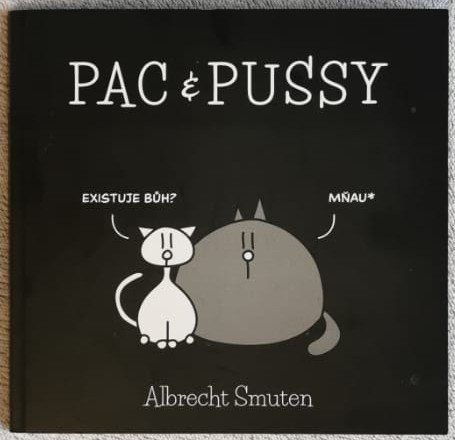
| W dzisiejszym odcinku mam przyjemność zapoznać Was z niezwykłymi kotkami – przed państwem biały kocur Pac oraz czarna kotka Pussy, które powołał do życia Albrecht Smuten z Czech. Pac i Pussy pierwotnie zamieszkiwały fanpage autora na Facebooku, jednak w pewnym momencie przeniosły się na papier. Powstały trzy książeczki z komiksami o ich przygodach (więcej niestety nie będzie, Albrecht niestety przegrał walkę z białaczką), które to książeczki Wam tu zaprezentuję – dziś część pierwszą, a pozostałe… w swoim czasie :) |
In today’s episode, I have the pleasure of introducing you to two extraordinary cats – please welcome the white tomcat Pac and the black female cat Pussy, brought to life by Albrecht Smuten from the Czech Republic. Pac and Pussy originally lived on the author’s Facebook fan page, but at some point, they made the leap to paper. Three comic books were published featuring their adventures (sadly, there won’t be any more, as Albrecht lost his battle with leukemia). I’ll be presenting those books here – today, volume one, and the others… in due time :) |
| Historyjki o Pacu i Pussy są czteroobrazkowe i mieszczą się na jednej stronicy. Takich stronic w pierwszym tomie jest 80. Tematyka jest dość zróżnicowana – kotki potrafią roztrząsać zarówno kocie sprawy (zwykłe i niezwykłe), |
The Pac and Pussy comics are four-panel strips, each occupying a single page. The first volume contains 80 such pages. The themes are quite varied – the cats ponder both ordinary and extraordinary feline matters: |
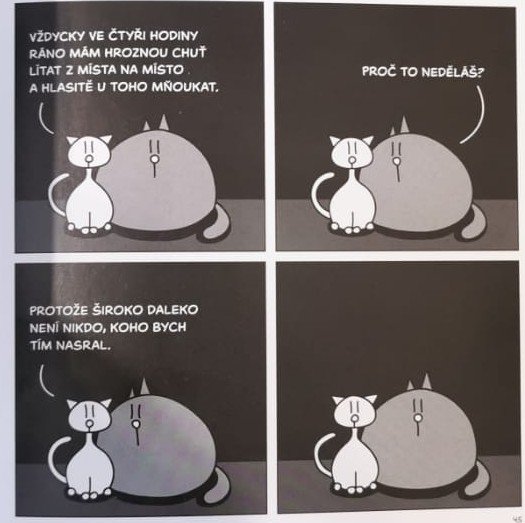
|
1.– Zawsze o czwartej nad ranem mam straszną chęć biegać z miejsca na miejsce i do tego głośno miauczeć. 2.– Czemu tego nie robisz? 3.– Bo nigdzie w pobliżu nie ma nikogo, kogo bym tym wkurzył. |
1.– I always get this insane urge to run around and meow loudly at four in the morning. 2.– So why don’t you do it? 3.– Because there’s no one around I could piss off with it. |
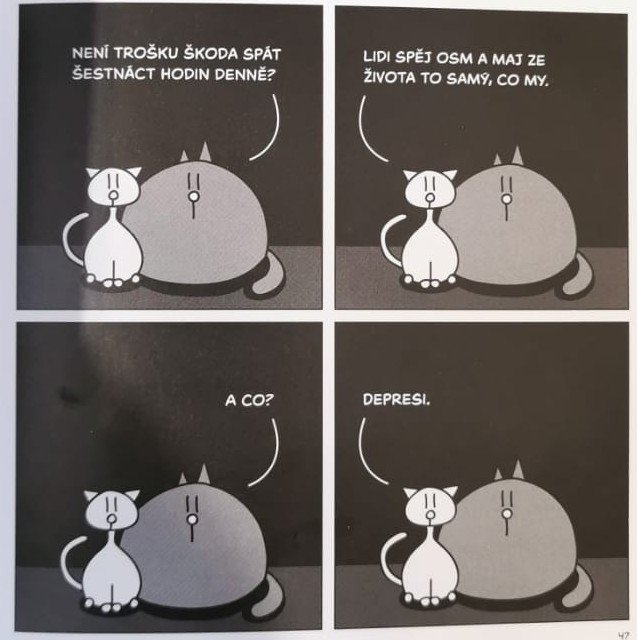
| 1.- Nie jest trochę szkoda spać po szesnaście godzin dziennie? 2.– Ludzie śpią po osiem i mają z życia to samo, co my. 3.– A co takiego? 4.– Depresję. |
1.– Isn’t it kind of a waste to sleep sixteen hours a day? 2.– Humans sleep eight and get the same out of life as we do. 3.– Which is? 4.– Depression. |
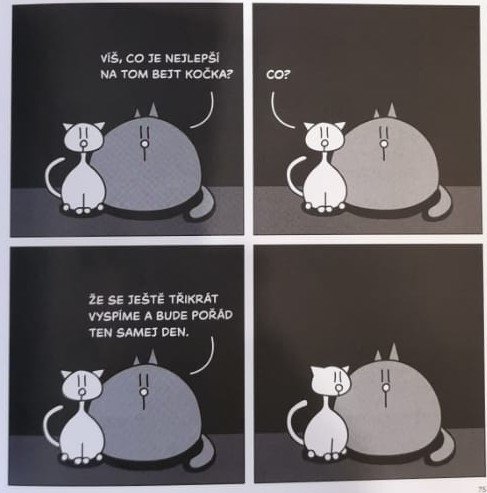
| 1.– Wiesz, co jest najlepsze w byciu kotem? 2.– Co? 3.– Że się jeszcze trzy razy wyśpimy, a wciąż będzie ten sam dzień. |
1.– You know what the best thing about being a cat is? 2.– What? 3.– We can sleep three more times and it’ll still be the same day. |
| jak też i tematy bardzo ludzkie – i te codzienne, przyziemne, | They also delve into very human topics – the mundane and everyday: |
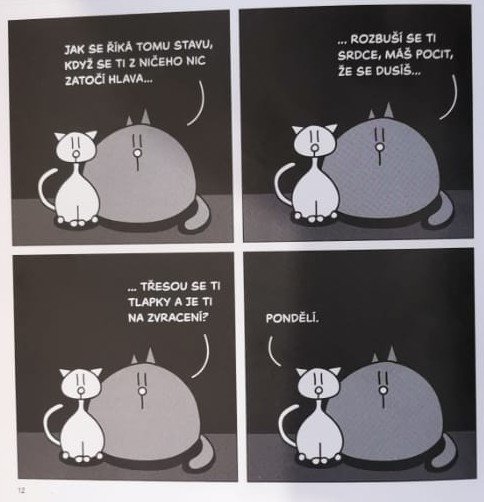
| 1.– Jak się nazywa ten stan, kiedy bez powodu kręci ci się w głowie… 2.– wali ci serce, czujesz, że się dusisz… 3.– trzęsą ci się łapki i chcesz wymiotować? 4.– Poniedziałek. |
1.– What’s that thing called, when you feel dizzy for no reason… 2.– your heart’s racing, you feel like you can’t breathe… 3.– your paws are shaking and you wanna throw up? 4.– Monday. |
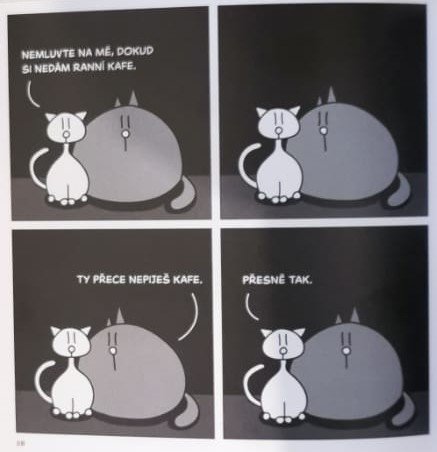
| 1.– Nie odzywajcie się do mnie, zanim nie wypiję porannej kawy. 2.– Ale ty przecież nie pijesz kawy. 3.– No właśnie. |
1.– Don’t talk to me until I’ve had my morning coffee. 2.– But you don’t drink coffee. 3.– Exactly. |
| jak i uniwersalne, filozoficzne | …as well as the universal and philosophical: |
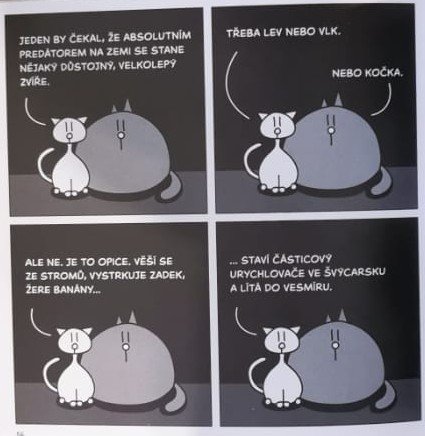
| 1.– Można by pomyśleć, że idealnym drapieżnikiem na Ziemi zostanie jakieś dostojne, wspaniałe zwierzę. 2.– Na przykład lew albo wilk. – Albo kot. 3.– Ale nie. Jest to małpa. Zwisa z drzew, wystawia zadek, żre banany… 4.– buduje akcelerator cząstek w Szwajcarii i lata w kosmos. |
1.– You’d think the ultimate predator on Earth would be some noble, majestic creature. 2.– Like a lion or a wolf. – Or a cat. 3.– But nope. It’s a monkey. It hangs from trees, flashes its butt, eats bananas… 4.– builds particle accelerators in Switzerland and flies into space. |
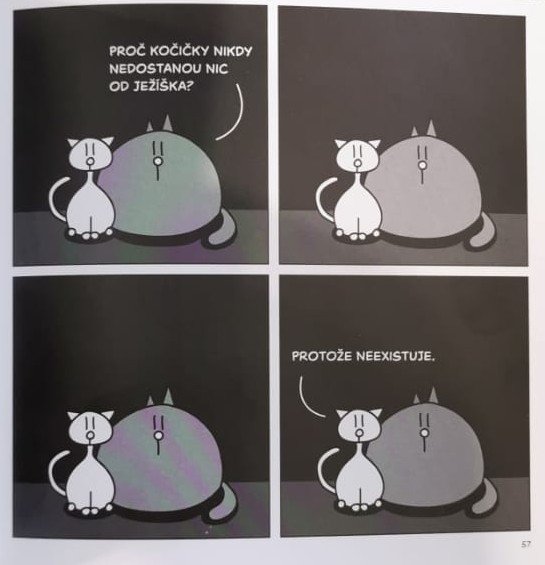
| 1.– Dlaczego kotki nie dostają nic od świętego Mikołaja? 2.– Bo nie istnieje. |
1.– Why don’t cats get anything from Santa Claus? 2.– Because he doesn’t exist. |
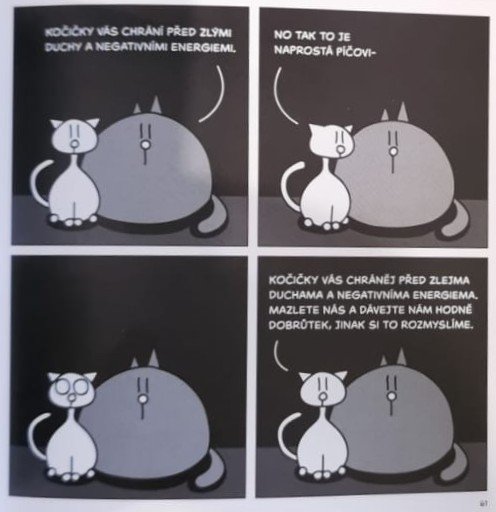
| 1.- Kotki chronią was przed złymi duchami i negatywną energią. 2.– Ale to są po prostu bzd… 3.– Kotki chronią was przed złymi duchami i negatywną energią. Rozpieszczajcie nas i dawajcie nam dużo smaczków, bo się rozmyślimy. |
1.– Cats protect you from evil spirits and negative energy. 2.– But that’s just bull– 3.– Cats protect you from evil spirits and negative energy. Spoil us and give us lots of treats, or we’ll change our minds. |
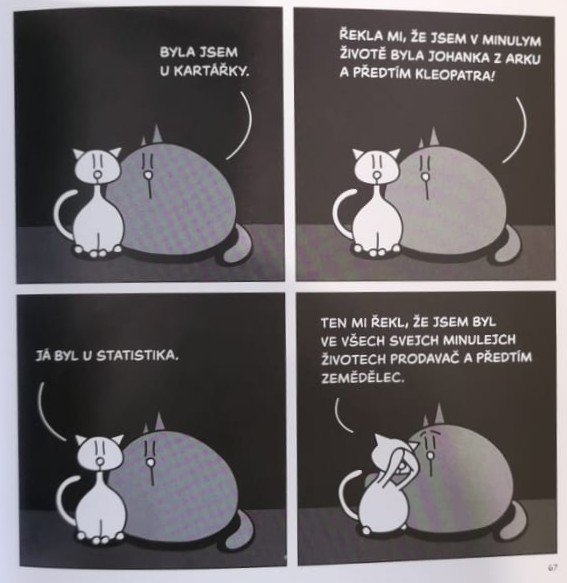
| 1.– Byłam u wróżki. 2.– Powiedziała mi, że w poprzednim wcieleniu byłam Joanną d’Arc, a wcześniej – Kleopatrą. 3.– Ja byłem u statystyka. 4.– Powiedział mi, że we wszystkich swoich poprzednich życiach byłem sprzedawcą, a wcześniej – chłopem. |
1.– I went to see a fortune teller. 2.– She told me that in a past life I was Joan of Arc, and before that – Cleopatra. 3.– I went to see a statistician. 4.– He told me I was a salesman in my past life. Before that – a peasant. |
| zahaczając niekiedy nawet o tematy bosko-religijne. | …sometimes even brushing up against the divine and religious: |

| 1.- Smutno mi. 2.– A wiedziałeś, że za rogiem jest miseczka pełna szczęścia? – Serio? Mogę ją zobaczyć? 3.– Nie. Musisz mi wierzyć i przez całe życie robić to, co powiem i dawać mi pieniądze. Dostaniesz ją po śmierci. 4.– W tej broszurce są prawdziwe relacje o kotkach, które ją widziały… - Spadaj! |
1.– I’m sad. 2.– Did you know there’s a bowl full of happiness just around the corner? – Really? Can I see it? 3.– No. You have to believe me and do everything I say for your whole life and give me money. You’ll get it after you die. 4.– This leaflet has true stories of cats who saw it… – Get lost! |
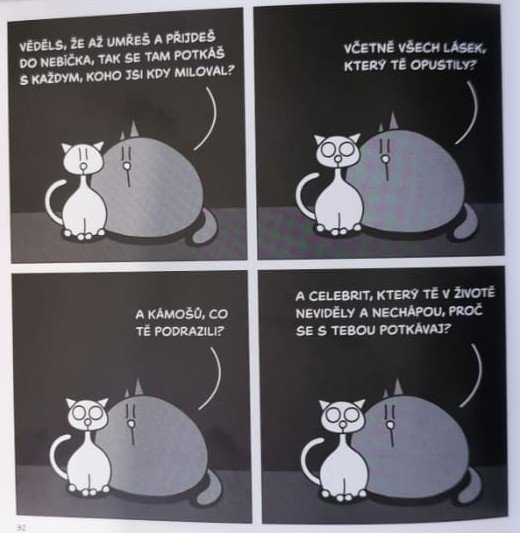
| 1.– Wiedziałeś, że kiedy umrzesz i trafisz do nieba, spotkasz tam każdego, kogo kiedyś kochałeś? 2.– I te laski, które cię rzuciły? 3.– I kumpli, którzy cię zawiedli? 4.– I celebrytów, którzy cię nigdy w życiu nie widzieli i nie rozumieją, czemu cię spotykają? |
1.– Did you know that when you die and go to heaven, you’ll meet everyone you ever loved? 2.– Even the girls who dumped you? 3.– And the buddies who betrayed you? 4.– And celebrities who never knew you existed and don’t understand they meet you? |
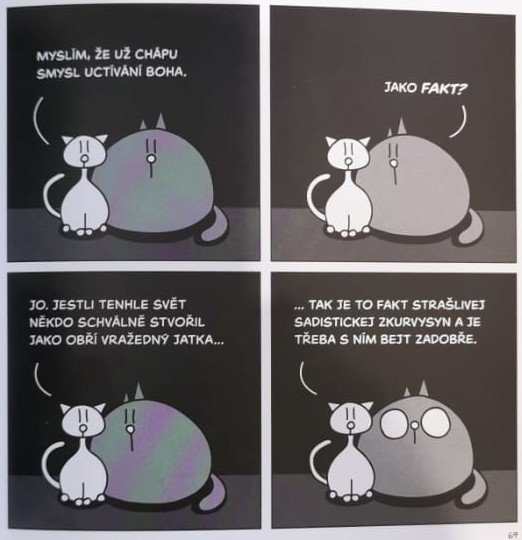
| 1.– Myślę, że już rozumiem sens czczenia Boga. 2.– Serio? 3.– Ano. Jeśli ten świat ktoś celowo stworzył, jako gigantyczną morderczą rzeźnię, 4.– to rzeczywiście jest to straszliwy, sadystyczny skurwysyn i trzeba mieć z nim dobre relacje. |
1.– I think I finally get the point of worshiping God. 2.– Really? 3.– Yeah. If someone did create this world intentionally as a giant, deathly slaughterhouse, 4.– then they’re a terrible, sadistic bastard and it’s probably best to stay on their good side. |
| Poczucie humoru autora jest dość specyficzne, przypuszczalnie nie każdemu przypadnie do gustu, ale mnie akurat się podoba. Dodatkowym plusem dla mnie jest kwestia językowa – mogę poćwiczyć swój czeski, a niektóre fragmenty wręcz brzmią w tym języku lepiej niż mogłyby po polsku. | The author’s sense of humor is quite specific – it probably won’t appeal to everyone, but I happen to really enjoy it. There’s also a linguistic bonus for me – I get to practice my Czech, and some lines even sound better in Czech than they possibly could in Polish. |
| Oczywiście w tym miejscu powiem, że polecam, aczkolwiek nieodzownym warunkiem jest albo pewien, trochę wyższy od podstawowego, poziom znajomości czeskiego, albo chęć do samodzielnej pracy ze słownikami – Google Translate jeszcze nie wszystkie żarty interpretuje prawidłowo. Moja ocena 8/10 – wśród dobrych historyjek zdarzają się i takie mniej śmieszne (albo nie umiem właściwie odczytać kontekstu!), a do tego tom jest za mały (wolałbym wszystkie 3 części w jednym!). | Of course, this is where I say: I recommend it – but with a caveat. You’ll need either a slightly more than basic grasp of Czech, or the willingness to work with dictionaries – Google Translate still doesn’t quite grasp all the jokes. My rating: 8/10 – Among the good ones, there are a few that fall flat (or maybe I just didn’t catch the right context!), and the volume is too short (I’d rather have all three parts in one!). |
| PS. W tym miejscu pora na ważne pytanie – jeśli polubiliście te kotełki, kwestie językowe Wam nie przeszkadzają i chcielibyście poznać więcej ich przygód, jak możecie to zrobić? Dawniej całość była dostępna na facebookowym profilu autora, jednak – czemu trudno się dziwić – w momencie wydania książek spora część historyjek stamtąd zniknęła. Dziś prawdopodobnie najprostszym sposobem są ebooki dostępne na stronie) w cenie (na dziś) 237 koron (ok. 41 zł) za komplet. | P.S. An important question at this point – if you’ve fallen for these kitties, aren’t put off by the language, and want to read more of their adventures, how can you do that? Once upon a time, all the comics were available on the author’s Facebook profile, but – unsurprisingly – most of them disappeared once the books were published. Nowadays, the easiest way is probably to buy the eBooks available on that website. As of today, the full set costs 237 Czech crowns (9.6 EUR / 11 USD). |
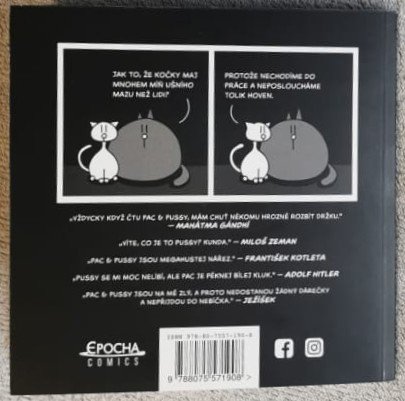 )
)
0
0
0.000
Hello avtandil!
It's nice to let you know that your article will take 7th place.
Your post is among 15 Best articles voted 7 days ago by the @hive-lu | King Lucoin Curator by szejq
You receive 🎖 0.5 unique LUBEST tokens as a reward. You can support Lu world and your curator, then he and you will receive 10x more of the winning token. There is a buyout offer waiting for him on the stock exchange. All you need to do is reblog Daily Report 693 with your winnings.
Buy Lu on the Hive-Engine exchange | World of Lu created by szejq
STOPor to resume write a wordSTART